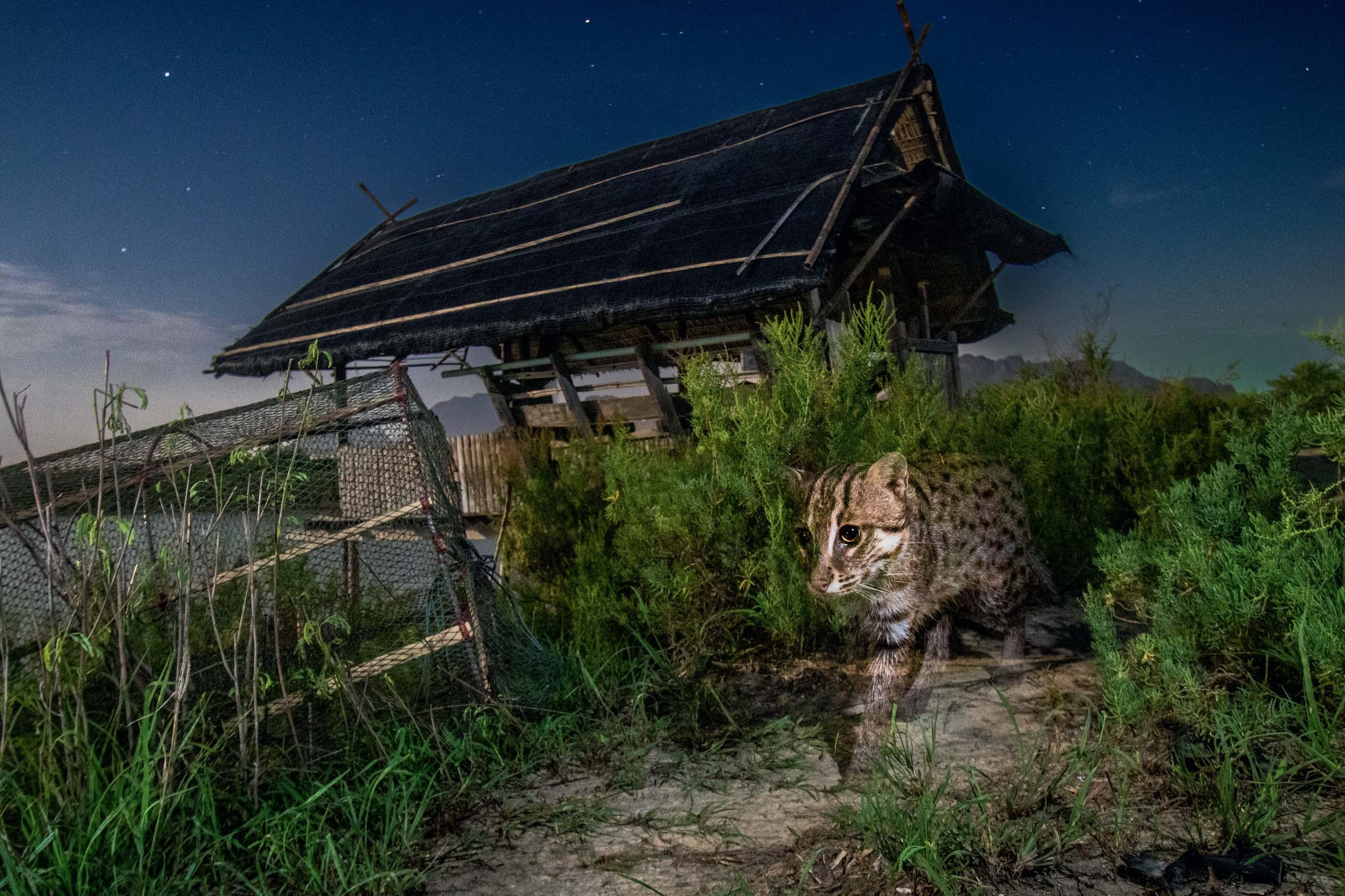Denemek ALTIN - Özgür
NIGHT PROWL
BBC Wildlife
|May 2024
As shrimp farms encroach on fishing cat habitat in Thailand, scientists are learning how these felines are adapting to a changing world
-

Shining a light
A fishing cat - a medium-sized feline native to South and South-East Asia - prowls a traditional shrimp farm near the border of Khao Sam Roi Yot National Park, Thailand. This rare wetland specialist is well adapted to its watery home, with partially webbed feet and non-retractable claws for spearing slippery fish. The species is in decline across its range, largely due to habitat loss and poaching. In this part of Thailand, fishing cat habitat has become fragmented by shrimp farms and fishponds - so researchers are investigating how the animals are navigating this altered landscape.

To catch a cat
Biologists Chaiwat Klakhaeng and Wiroon Mongkonsin set a box-trap to catch a fishing cat for radio-collaring. Bait goes in the small rear section, luring the animal into the larger front section. When a cat enters the trap, it steps on a pressure plate, triggering the entrance flap to swing shut. Boxtraps are considered a very safe way of catching cats.

A changing view
Designated in 1996 as Thailand's first marine park, Khao Sam Roi Yot encompasses 98km² of coast facing the Gulf of Thailand. The area is known for its steep, forested hills and expansive marsh, but shrimp farms are dramatically altering the landscape.

Night watch
Bu hikaye BBC Wildlife dergisinin May 2024 baskısından alınmıştır.
Binlerce özenle seçilmiş premium hikayeye ve 9.000'den fazla dergi ve gazeteye erişmek için Magzter GOLD'a abone olun.
Zaten abone misiniz? Oturum aç
BBC Wildlife'den DAHA FAZLA HİKAYE

BBC Wildlife
SNAP-CHAT
Isaac Szabo talks hellbenders, chub nests and bears on the roof
3 mins
December 2025

BBC Wildlife
Why are the tropics so diverse?
AS YOU MOVE FROM THE POLES towards the equator, species richness increases.
1 mins
December 2025

BBC Wildlife
Magnificent frigatebird
ONE MIGHT BE FORGIVEN FOR thinking that pterodactyls had been de-extincted upon first sighting the silhouette of a magnificent frigatebird.
3 mins
December 2025

BBC Wildlife
YEAR OF THE CAT
Once a phantom of Chile's windswept peaks, this plucky feline is making a comeback
3 mins
December 2025

BBC Wildlife
KATE BRADBURY
“I feel I am part bird at this point at the year's end: I'm ready for spring”
2 mins
December 2025

BBC Wildlife
SNOW DAYS
High in the boreal forests of Colorado, the snowshoe hare lives a secretive life. But one photographer has gained a unique window into its world
3 mins
December 2025

BBC Wildlife
A journey into sound
Progressive hearing loss prompted a memorable quest to absorb nature's calls and choruses
7 mins
December 2025

BBC Wildlife
WILD IN THE CITY
A huge parliament of long-eared owls has made an unlikely home in a Serbian town square
2 mins
December 2025

BBC Wildlife
Birds follow the flames
In the Sierra Nevada of California, fire gives some birds a boost
1 mins
December 2025

BBC Wildlife
Remembering Jane
The ethologist, conservationist and humanitarian Dr Jane Goodall died in October. We reflect on the woman who gave the world hope
5 mins
December 2025
Listen
Translate
Change font size
